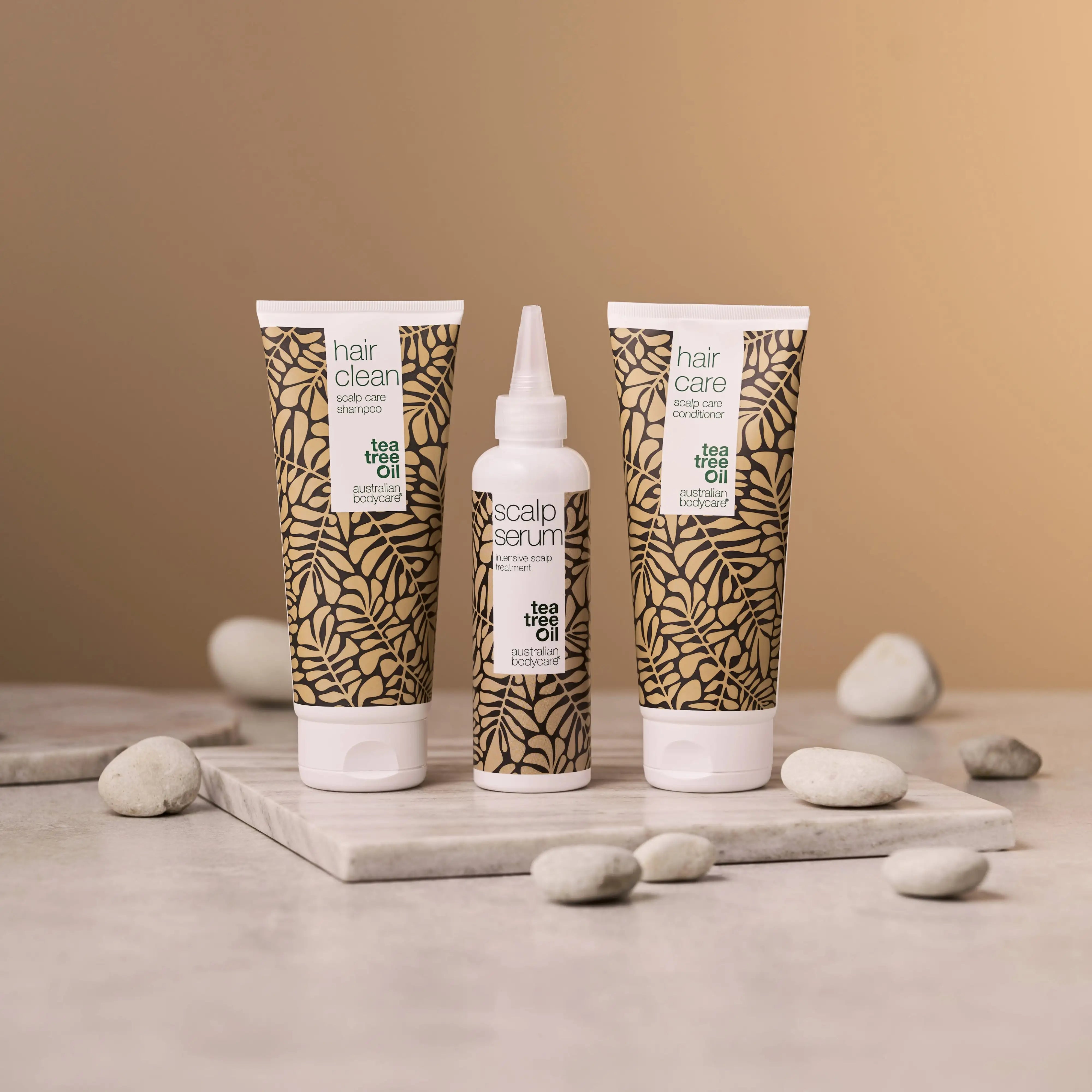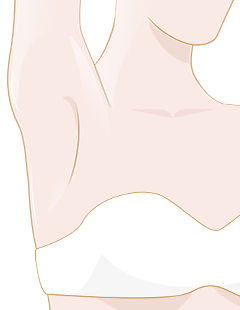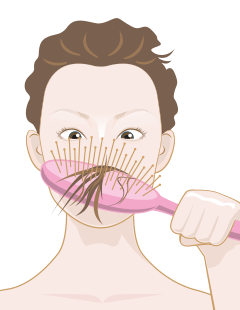Scalp problems can be treated
Table of contents
Are you experiencing scalp problems?
Watch this video to find out what you can do to tackle scalp problems yourself.
If you have hair on your head, your scalp is probably not something you give much thought to. Unless, that is, your scalp suddenly starts itching or you notice something different that isn't usually there. If you're bald, your scalp looks completely different. Of course, this means that if something changes, you'll notice it quickly, but it also means that it's hard to hide scalp problems.
Problems related to the scalp are typically about the scalp feeling dry, itchy, feeling greasy, or developing eczema or patches.
Anyone can experience periodic problems with their scalp; for others, unfortunately, the problems are more constant. But whatever the cause, most scalp problems are treatable - or at least alleviate the symptoms that bother you.
Scalp problems are neither age nor gender specific. Both men and women can have scalp problems. And they can affect all age groups, from newborns to children, adolescents, adults and the elderly.
Jump straight to:
Scalp thrush
Scalp thrush is a troublesome condition that is accompanied by discomfort and often severe itching. Anyone can get scalp thrush, but children are particularly affected by the fungal infection.
The infection is caused by the skin fungus dermatophyte and in the vast majority of cases the infection is transmitted from domestic animals such as guinea pigs, cats, dogs, rabbits or other small animals. The skin of the scalp is often irritated, with itchy patches, which in some cases can develop into inflammation and, in the worst cases, a fluid-filled abscess.
Scalp thrush does not go away on its own, so it is important to treat it. An untreated fungal infection of the scalp can ultimately lead to patchy baldness and permanent hair loss. At the same time, it is also important to treat it, as you can infect others. In this guide, you can read more about the treatment and prevention of scalp thrush.
Wounds on the scalp
Everyone experiences a scalp ulcer from time to time. In many cases, a scalp wound is caused by an itchy scalp. The more itchy it is, the more we itch - for example, if you have a mosquito bite, if you suffer from psoriasis, or if you have a fungal infection on your scalp. The itchy sensation can mean that you end up scratching your skin - and that's what causes ulcers.
You can also get a scalp wound if you've used harsh styling products or hair colour. Bleaching is particularly harsh on the skin, and if the bleach has come into contact with the skin on the scalp, it can cause a cauterisation injury and thus a wound in some people.
Regardless of how you got a scalp wound, you need to be aware of it. If a wound does not heal, it can in the worst case be a sign of cancer - therefore it is also a good idea to consult your doctor. Read more about scalp ulcers and how to treat them.
Itchy scalp
An itchy scalp is a scalp where the skin is irritated. If you have problems with your scalp, itching will often be the first symptom that something is wrong. Itching is a symptom of something else - which is why it's important to find the cause and not just treat the symptoms.
Symptoms and causes
There can be many different causes of scalp itching. Lice can cause severe itching of the scalp. In addition, itching can be caused by anything from a harmless allergic reaction to a more serious illness.
For example, itching, burning and irritation of the scalp can be caused by fungus. Dandruff can also cause itching. If you have a dry or oily scalp, your scalp will typically start to itch. Different types of eczema and psoriasis will also cause the scalp to itch.
So there can be many different reasons why the scalp itches. In addition to itching, you may also experience irritation and pain. If you scratch and scratch so much that you break the skin, it can hurt. But you also run the risk of the wound becoming infected with bacteria. That's why it's important to do something about the itching as soon as you notice it.
Preventative methods and treatment
Video: 3 steps in the battle against an itchy scalp
Read more: How to treat an itchy scalp
The first thing to do when you have an itchy scalp is to check for lice (unless you are bald, in which case you don't need to worry about lice). If lice are present, this may explain why it itches. And if lice are the cause of the itching, the itching will quickly disappear once the lice are gone. If you don't have lice, consider whether you are using too harsh a shampoo on your scalp. And if not, you should have your itching checked by a doctor.
There can be many different causes of an itchy scalp, so it can be difficult to find the cause yourself.
When the itching is on the scalp, the obvious thing to look at is your shampoo. But if changing shampoo doesn't help and the itching is caused by eczema, psoriasis or allergies, for example, it's important to see a doctor to get rid of the itching.
The solution may be a tablet treatment with antihistamines or an anti-itch ointment or cream.
For itching caused by thrush on the scalp, a shampoo with antifungal ingredients can often solve the problem. Dandruff is also caused by a fungus, which is why a dandruff shampoo or a shampoo against fungus on the scalp can often get rid of dandruff. If you are severely affected by dandruff, you may need a tablet treatment or cream/ointment.
However, many people prefer to fight dandruff with natural alternatives instead. Our Scalp Serum is an effective scalp treatment for dry scalp with the natural antiseptic Tea Tree Oil.
The scalp treatment prevents itching and has a calming and soothing effect.
ALSO READ: How to get rid of a itchy scalp
Eczema on the scalp
Eczema is a very common skin condition that many people suffer from. You can have eczema all over your body, including on your scalp. When you have eczema, your skin becomes red, irritated and itchy, and it may also swell. Later, the skin may become dry and scaly. Some people may get eczema only once in their lives, while others suffer from eczema all their lives.
There are several different types of eczema that can affect the scalp. In general, scalp eczema is typically worse in winter, when humidity is low and it is cold and windy.
Eczema on the scalp needs to be treated with moisturiser. On the scalp, you can switch to a shampoo that doesn't dry out the scalp as much. Our Hair Clean Shampoo effectively washes the hair clean, has an antipruritic effect and contains antibacterial Tea Tree Oil, which effectively fights bacteria.
Scalp eczema
Scalp eczema, also known as seborrhoeic eczema, can cause scaling and itching of the scalp. Seborrhoea is often seen in infants and in younger men and adults in general. The dandruff experience is caused by a yeast fungus that lives in the oily skin, called Pityrosporum Ovale.
For scalp eczema, you can use an antifungal hair shampoo and/or oil.
READ MORE: How to get rid of scalp eczema
Solar eczema
In solar eczema, the skin itches and develops a reddish rash with small bumps or blisters. It is caused by a reaction to the sun's rays, either because you don't tolerate the sun well or because you have been in the sun for too long. Of course, people without hair on their heads are particularly prone to scalp sunburn, but anyone can get sunburn on the scalp. The treatment is moisturising - and, of course, avoiding the sun for a period of time.
Oily scalp
Oily scalp is a problem that many people suffer from. If you have problems with an oily scalp, your hair will quickly become greasy and clumpy, and to avoid this you probably wash your hair every day.
Symptoms and causes
Frequent hair washing actually makes things worse, because when we wash our hair, we degrease the scalp and remove the natural oil layer. For the body, this is a signal for the sebaceous glands to start producing more sebum to protect the scalp from becoming too dry. When the scalp produces more sebum, the scalp and hair become more oily. If you have problems with oily hair, read here: how to get rid of oily hair.
Anyone can have an oily scalp, but there is often a link between an oily scalp and oily and blemished skin caused by increased sebum production and clogged sebaceous glands.
Preventative methods and treatment
The best thing you can do for an oily scalp is to skip washing your hair every other day. It may feel uncomfortable at first because your hair gets greasy, but it will gradually get better. You may want to use a dry shampoo on days when you don't wash your hair because it absorbs the oil from your scalp.
You can have an oily scalp and dry hair. But the shampoo should be gentle on the scalp, and then you need to treat the ends with conditioners and hair treatments. Remember that conditioner should only be used on the ends of the hair and not on the scalp - otherwise you risk making your scalp unnecessarily oily.
There are many mild shampoos for oily scalp and hair, including shampoos with natural ingredients. For example, our Hair Clean shampoo is great for removing grease and styling products from your scalp and hair.
If your oily scalp is due to problems with acne and blemishes, your doctor can help you. Pill treatment may also help with scalp problems. Ointment or cream for blemished skin can also be used on the scalp.
Watch: 3 steps in the battle against an oily scalp
Read more : This is how you get rid of an oily scalp
Psoriasis on the scalp
Psoriasis is an inflammatory disease that is an inflammatory condition of the skin. The symptoms of psoriasis are red, thickened patches on the skin that are typically clearly defined. The patches will often be covered by a whitish, shiny scale. The affected areas may itch.
Scalp psoriasis is a very common type of psoriasis, affecting around one in two people with psoriasis. It typically occurs in the hairline behind the ears, on the back of the neck or on the forehead, where it appears as slightly red patches or itchy, thickened areas of scales.
Psoriasis cannot be cured, but the symptoms can be treated. This can include creams, ointments, shampoos, foams and liniments. In addition, phototherapy, climatic treatment with baths or systemic treatment with tablets or injections may be a solution. Our hair care range moisturises the scalp and has an anti-itching effect.
Pimples on the scalp
We humans can get pimples anywhere on the body - including on the scalp. Wherever they are, they are a disfiguring problem for many people. And although they are less visible on the scalp - if you have hair, of course - they can still be sore, inflamed and uncomfortable. Especially during puberty, pimples appear on the cheeks, forehead, back and scalp. But adults can also suffer from these inflamed pesky pimples.
Avoid squeezing the pimples as much as possible, as they can quickly harbour dirt and bacteria, which can cause scarring and painful infections. The right treatment and prevention is good cleansing, which you can read more about in this guide on pimples on the scalp.
Pimples on the scalp, like pimples anywhere else on the body, are caused by clogged sebaceous glands. And when you produce a lot of hormones, you also produce a lot of sebum, which clogs the pores and causes a minor inflammation of the skin.
Dandruff on the scalp
Small white flakes of skin on your shoulders are a sign that you have dandruff on your scalp. This is because dandruff is dead skin cells that flake off and shed through your hair and onto your clothes. The amount of dandruff can vary greatly. People who have a lot of dandruff are also often the ones who experience white flaky shoulders.
Men, women and young people can all suffer from dandruff, which is neither a disease nor contagious. However, that doesn't make it any less of an issue. With Australian Bodycare's hair kit, you can get the care you need for your scaly scalp.
Dandruff is often referred to as the white flakes, but in fact, dandruff can also be a more oily condition of the scalp, accompanied by a yellow-brown greasy surface that you can scratch off with a fingernail. Whatever the type of dandruff is, it will often make the scalp dry and itchy.
That's why it's important that if you have an itchy scalp, it's important to determine whether it's dandruff and that you're not harbouring lice, which are easily and quickly infected. Find out what causes dandruff and what you can do about it in this guide on scalp dandruff.
Pain on the scalp
Most people have experienced scalp pain. Maybe you have a pimple, or you've had a fungal infection, or you've bleached your hair too harshly. In all cases, it can cause a sore scalp.
Many women are probably familiar with the problem of a sore scalp after a day with their hair in a tight ponytail. When the hair is loosened, it causes a sore and painful sensation that is felt in both the scalp and hair. In fact, it is the hair follicles that hurt. Because each hair follicle is equipped with a nerve ending, the whole hair is part of an integrated nervous system. A tight haircut therefore pulls on the nerve endings, and when the hair is loosened, the nerve endings get 'air' again - and this can cause a sore feeling.
Whatever the cause of the scalp pain, it will often be associated with a headache. This is because the skin is affected in one way or another.
Sore scalp
If you have a sensitive scalp, it will often feel dry and tender. Just as the skin on your face can feel itchy, dry, tight and irritated, so can the skin on your scalp. Every day, it's exposed to a variety of factors, such as pollution and stress, which can make it particularly sensitive.
This can leave it feeling itchy, dry and tender. This is also where dandruff can occur because the scalp's microorganisms multiply and develop much faster, resulting in either oily or dry dandruff.
Eating a monotonous diet and using harsh shampoos and styling products can contribute to your scalp feeling sore. That's why it's important to eat a healthy and varied diet and avoid stress, among other things. For example, you can take care of your scalp with Australian Bodycare's hair kit, which effectively soothes and cools an irritated scalp. Read more about how to overcome a sore scalp here.
Seborrheic Dermatitis
Seborrheic Dermatitis is a common condition. But what exactly is seborrheic Dermatitis? Seborrheic Dermatitis is a build-up of skin fat and dead skin cells that are normally shed from the scalp. It can affect anyone, but is most commonly seen in babies.
It is a form of dandruff eczema that causes the affected person to have oily dandruff, which can be yellowish, brownish or reddish in colour. The term seborrheic dermatitis is often used to describe children with these symptoms, while eczema is used to describe the condition in adults. Typically, the condition is caused by the yeast fungus Pityrosporum Ovale, which lives naturally on the skin of the scalp, but will develop into dandruff if the conditions are favourable.
Seborrheic dermatitis require treatment and it is important to maintain good scalp hygiene. You can do this, for example, with a hair care kit from Australian Bodycare, which has antibacterial properties while soothing the discomfort caused by scalp scars.
Atheromas on the scalp
If you notice a lump on your scalp, you should have it checked by a doctor. It may be an atheroma, which is another name for a sebaceous nodule, sebaceous cyst or hair follicle cyst.
An atheroma is a cyst (a fluid-filled cavity) that has formed due to a blocked sebaceous gland that has filled up with accumulated shed skin cells and sebum. An atheroma can be from a few millimetres up to 5-10 mm or even larger.
Atheromas are harmless, but if they are in a location that is bothersome or cosmetically unsightly, they can be removed surgically. If the atheroma becomes infected, the symptoms will be similar to those of an abscess. The skin will feel warm, swell, become red and tender. An infected atheroma should be removed. If you prefer alternative treatments, tea tree oil, among others, is claimed to be effective against atheromas and abscesses.
FAQ about scalp problems
What is the difference between dandruff and dry scalp?
When you have a dry scalp, you may find that it itches and sprinkles with dry, whitish dandruff. However, dry scalp and dandruff are not the same. Dandruff is caused by a fungal infection and typically produces oily yellowish dandruff, while dry scalp is caused by dryness of the skin.
What to do about dry scalp?
The first thing to try if your scalp is dry is to switch to a milder shampoo and skip some hair washes. You can also use an oil for dry scalp. If this doesn't work, you should have your scalp checked by a doctor, as there can be various other causes of dry scalp.
> Scalp serum for a dry scalp
What causes a dry scalp?
Dry scalp is caused by the sebaceous glands not producing enough sebum and therefore the skin becomes dry. Various diseases can also cause dry scalp. Finally, winter is hard on the skin and scalp, which tends to become drier in cold, windy weather.
Why does my scalp hurt?
Your scalp can hurt because it itches, because your skin is sensitive and irritated, because you have eczema or for any other reason. There can be many reasons and it can also be caused by a disease, so you should always go to the doctor for a check-up if your scalp hurts for a long period of time and for unexplained reasons.
Why does my scalp itch?
There can be many reasons why your scalp itches. It can be due to dry scalp, oily scalp, fungus, psoriasis, eczema or something else entirely. And of course, it can also be caused by lice. Our hair clean shampoo effectively counteracts the bacteria on the scalp that cause dandruff, itching and irritation.
Why does my scalp smell?
There can be several different reasons why you experience an odour on your scalp. It can be caused by fungus, oily scalp or eczema, among other things. In short: A scalp that is not quite in balance. And of course, it could also be because you don't wash your hair often enough.




